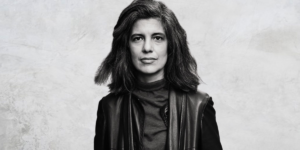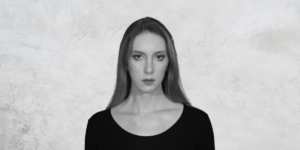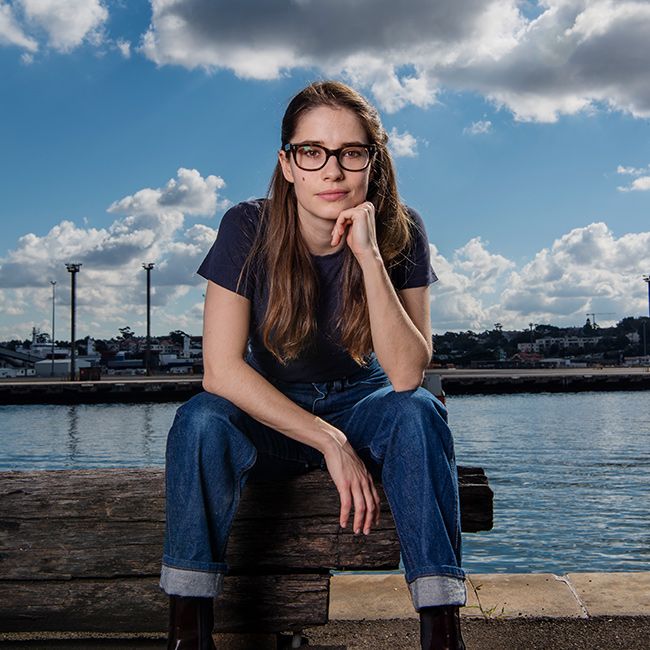
9 LGBTQIA+ big thinkers you should know about
Big thinkerRelationshipsSociety + Culture
BY The Ethics Centre 15 FEB 2023
In celebration of Sydney World Pride and Sydney Gay and Lesbian Mardi Gras, we’ve profiled nine notable thinkers who have contributed to our understanding of gender, sexuality and identity in some way. Whether navigating such spaces themselves or contributing to prominent research in the field, these figures have propelled public awareness of LGBTQIA+ issues in a meaningful way.
Michael Foucault (he/him)
Michael Foucault (1926-1984) was a daring, outspoken French philosopher, historian and psychologist. Much of his work was concerned with power and the random, coincidental ways in which big ideas and movements manifest in public consciousness. He explored the idea of sexuality in great extent and the modern fixation to define it and attribute sexual relations to an identity. To him, such definitions and labels effectively “other” parts of the population whose sexual behaviours are seen as deviant from the norm, even though evidence of same sex relations is present throughout human history.
Foucault thoroughly explored these ideas in his study, The History of Sexuality. He did not believe sexuality could be definitively defined – and any attempt to define it, in his eyes, constrained the mobility of human sexuality, which he believed ought to be fluid. Foucault’s provocative ideas and the content of The History of Sexuality laid the foundation for what Teresa de Lauretis would later call “queer theory”.
Judith Butler (they/them)
Judith Butler (1954-present) is an American activist whose writings and philosophies colour their commitment to radical equality. They are best known for writing Gender Trouble: Feminism and the Subversion of Identity, which is widely considered a founding text of queer theory. In the world-renowned book, Butler rejects the stance that gender equals biology, instead viewing gender as a product of behaviours and self-expression. To them, gender is produced by performance and is the root of their idea of “gender performativity”.
To eliminate any confusion on its definition, Butler explains that “We are formed through gender assignment, gender norms and expectations. But we’re not trapped. We can work and play with them [and] open-up spaces that feel better or more real for us.”
Audre Lorde (she/her)
Professionally a poet, professor and philosopher, Audre Lorde (1934-1992) also proudly carried the titles of intersectional feminist, civil rights activist, mother, socialist, “Black, lesbian [and] warrior.” She is also the woman behind the popular manifesto “the master’s tools will never dismantle the master’s house.”
Lorde’s self-expression and personal philosophy has became one of the greatest contributions to the discourse on discrimination and equality today. By offering an authentic depiction of the female, queer and Black experience, she portrayed the good, the bad and the complex. She felt academic discourse on feminism was white and heterosexual centric, lacking consideration of the lived realities so she put the stories of these women at the centre of her literature. An advocate for difference amongst human beings, Lorde’s difference was key to helping eradicate discrimination and moving forward in unity.
Raewyn Connell (she/her)
Raewyn Connell (1944-present) is an Australian sociologist. Born in Sydney, she approaches her research work with what she calls “southern theory”. Essentially, this perspective gives space to the global south’s backgrounds, which are often overshadowed by northern narratives. Connell was initially recognised for her research on class dynamics, exploring how class and power are inextricably linked and thus defined class as a social structure. This social framework propelled Connell into the realm of sexuality, which she also viewed as a social structure. Exploring how class influences and shapes gender, she understood gender as multi-dimensional and subject to change; something far beyond a mere aspect of our social identity.
In Masculinities – one of her most famous works — Connell coined the term “hegemonic masculinity”, which is the most dominant and socially celebrated version of a man. Though best known for her work in male studies, she explained that “my theoretical concern was the gender order as a whole; masculinity was one piece of the jigsaw”. Additionally, she’s written about her experience as a trans woman, gender equality, poverty, AIDS prevention and education.
Dennis Altman (he/him)
Dennis Altman (1943-present) is an Australian queer thinker and professor of politics at La Trobe University. His 1971 book, Homosexual: Oppression and Liberation, kickstarted his outstanding career that eventually led The Bulletin to name him one of the 100 most influential Australians. He primarily pondered the differences between radical gay activists who question heteronormative frameworks versus the tamer gay equality activists who demanded space in such frameworks. As time went on, Altman’s predictions of the normalisation of homosexuality laid out in his 1971 book proved correct. And though such advancements are certainly ones to celebrate, part of Altman mourns the radical roots of gay liberation.
For his complete support of gay rights, his opposition of same sex marriage might come as a surprise, but not if you consider the fact that he opposes marriage of any kind. In rejecting “the assumption that there is only one way of living a life”, Altman never married his partner of twenty years. He vehemently stands by the “equal right not to marry” and refuses to seek permission from the state and religious bodies that don’t want to sanction same sex relationships.

Susan Sontag (she/her)
Susan Sontag (1933-2004) was a relentless and prolific writer, philosopher, playwright, filmmaker and activist. She obsessively pursued the truth and had the courage to express it, no matter how unpalatable. To her, “All understanding begins with our not accepting the world as it appears.” Sontag’s first notable work, Notes on “Camp”, is what propelled her into the public eye, especially after it appeared in Time Magazine. Best known for detailing modern culture and aesthetics, her work expanded definitions of the word “camp” – for instance, using it to define works of art when they fail at being serious.
Her extremely publicised divorce from sociologist and cultural critic Philip Rieff in 1957 forced her into the public eye and involuntarily exposed her sexuality. Rather famously, after that event, she never formally came out as lesbian or bisexual. On this, in an interview with the New Yorker, she said, “That I have had girlfriends as well as boyfriends is what? Is something I never thought I was supposed to say since it seems to me the most natural thing in the world.”

Natalie Wynn (she/her)
Natalie Wynn (1988-present) is an American, Baltimore-based YouTube personality whose work aims to educate via theatrical entertainment and humour. In a play-like fashion, Wynn plays different characters and wears complex costumes to try and voice all sides of an issue, from which the audience can draw their own conclusions. On her channel, ContraPoints (like counterarguments), she tries to make people think; and beyond that, she wants them to question why they think that way in the first place. Wynn questions, “What matters more: The way things are or the way things look?”
As a transgender woman, many of her videos tackle trans experience, sexuality and gender roles. Wynn principally tries to depolarise conversations that typically divide people and humanise those who are questioning their own identity and sexuality. She claims that “in a free society, different people will have lots of different sexual lifestyles,” and she uses her platform to give space to such lifestyles.
Masha Gessen (they/them)
Masha Gessen (1967-present) is an unreserved, influential journalist, activist and author. Born in Russia, they relocated to America to realise greater sexual freedoms. Called “Russia’s leading LGBT rights activist” they have candidly discussed living in Russia as an openly gay person at the time – where homosexual propaganda is illegal and removing children from same sex households is possible.
Gessen has brought international queer issues into academic discourse to better understand the anti-queer movement, like that in Russia. They’ve blatantly critiqued Russia’s president Vladimir Putin since he was first elected and holds that former American president Donald Trump is “worse” than him. Gessen continues to expose injustices and Russia’s rise of LGBTQIA+ hate crimes in the wake of the state’s homophobia.
Alok Vaid-Menon (they/them)
Alok Vaid-Menon (they/them) is an internationally acclaimed writer, comedian, poet, and public speaker whose work explores themes of trauma, belonging, and the human condition. Their 2020 book Beyond the Gender Binary has been described as a “clarion call for a new approach to gender in the 21st century.”
Their approach to fundamental and often violent clashes with peace and compassion can feel radically hopeful. Vaid-Menon says “I’m fighting for trans ordinariness… I want to be able to walk down the street wearing what I want without it having to be an event.”
Ethics in your inbox.
Get the latest inspiration, intelligence, events & more.
By signing up you agree to our privacy policy
You might be interested in…
Big thinker
Politics + Human Rights, Relationships
Big Thinker: Eleanor Roosevelt
Opinion + Analysis
Relationships, Science + Technology
The ethics of exploration: We cannot discover what we cannot see
Opinion + Analysis
Relationships, Society + Culture
Meet Eleanor, our new philosopher in residence
Big thinker
Health + Wellbeing, Relationships











